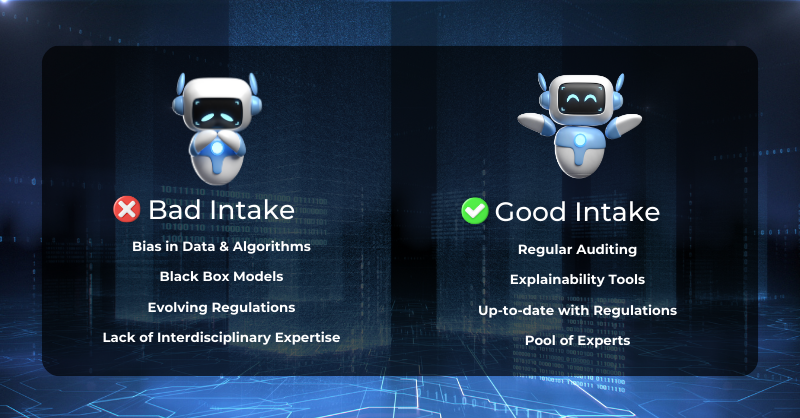As Artificial Intelligence (AI) continues to integrate deeply into various sectors, from healthcare to finance, it is important to ensure that AI systems are Fair, Accountable, and Transparent - what is referred to as FAT which helps in their wider adoption and building public trust. Auditing AI systems help organizations prove that their AI operates in an ethical, responsible, and transparent way. In this article, we will discuss the importance of FAT in AI systems, the role of auditing in achieving FAT, the challenges and how to overcome them, and the role of AuditOne in helping AI companies keep their systems in check.

Importance of FAT in AI systems
The principles of Fairness, Accountability, and Transparency are essential for making AI systems trustworthy and reliable.
Fairness: Fairness focuses on ensuring that AI systems make impartial decisions and do not discriminate against any individual or group. For example, AI used in HR systems should evaluate candidates purely based on skill set but not on Gender, Ethnicity, or Age.
Accountability: Accountability focuses on establishing clear lines of responsibility for AI decisions, ensuring that when outcomes are not as intended, those responsible can be identified and held accountable. For example, if an AI-driven financial system used in a bank responsible for loan approval or denial is given a biased decision based on gender, there should be a mechanism to trace the decision back to the developers or managers who can rectify it.
Transparency: Transparency focuses on making AI decisions understandable to users and stakeholders allowing them to see how decisions are made, which is important for maintaining public trust. For example, AI in healthcare recommending a treatment plan should allow both doctors and patients to understand the decision-making process so that alignment with medical best practices can be validated.
Related Article: Evolving AI Audits: Adapting to the Generative AI Era
Challenges in Achieving FAT
Bias in Data & Algorithms: The common issue in AI systems today is biases in data that are used for training models. These biases in data can end up in the algorithms, leading to unfair decisions. This issue is commonly seen in classical machine learning problems, and with large language models (LLMs), it has become even worse since they are trained on vast amounts of data from the web, which often contains inherent biases.
Black Box Models: Many AI systems, especially those using deep learning operate like "black boxes" which means their internal decision-making is hard to interpret making it a challenge to achieve the level of transparency needed.
Evolving Regulations: The rules and regulations in AI are constantly changing, which makes it challenging for organizations to keep up and stay compliant. For example, organizations in EU and non-EU serving customers need to comply with EU AI act which was recently enforced.
Lack of Interdisciplinary Expertise: Experts from different areas like technology, law, and ethics are needed in order to achieve FAT in AI systems. However, organizations struggle to find and combine this expertise in one team to effectively develop and audit AI systems.
How to overcome challenges to achieve FAT
Regular Audits: Audits help AI projects to understand the problems and fix them early. Regular audits help in continuously monitoring the AI systems throughout their existence and ensure the systems remain fair, accountable, and transparent.
Investing in Explainability: Explainability needs to be given priority during development. Utilizing libraries like LIME, and SHAP for classical ML solutions and investing in xAI toolboxes could make AI systems easier to understand and can help meet transparency goals.
Staying updated with Regulations: It is important for organizations to stay informed about the latest AI regulations. Regularly reviewing and updating practices according to new laws, such as the EU AI Act, ensures compliance and reduces the risk of legal issues.
Pool of Experts: Bringing together a diverse team of experts from different fields, such as AIML, Data Governance, Ethics, Security, Law, and industry, is essential. This approach ensures that AI systems are developed and audited with both technical and ethical considerations.
Read Next: AI Systems Auditing Insights: Enhancing Transparency, Security, and Legal Compliance
AuditOne: Your Partner in Keeping AI Systems in Check
At AuditOne, we specialize in conducting audits of AI systems to ensure they are fair, accountable, and transparent. Our pool of auditors comes from a wide range of fields, including AIML, Data Governance, Ethics, Security, and Law. This interdisciplinary expertise allows us to provide an all-around assessment of your AI systems. Our audits identify potential issues early so that companies can address them before they escalate. For more insights, check out our latest AI audit report.
At AuditOne, we also provide you with powerful tools like our EU AI Compliance Checker that help you stay ahead of regulatory changes and maintain compliance.
Book your Free Security Consultation:
Google Calendar: https://calendar.app.google/Ai15eyQhiV5c1pBXA
Telegram: https://t.me/m_ndr
.svg)

.avif)
.svg)
.svg)

.jpg)






